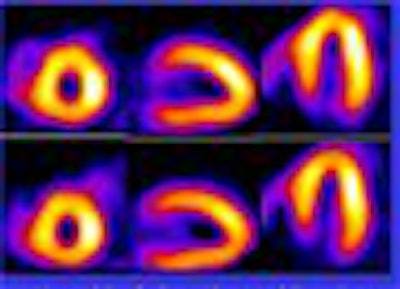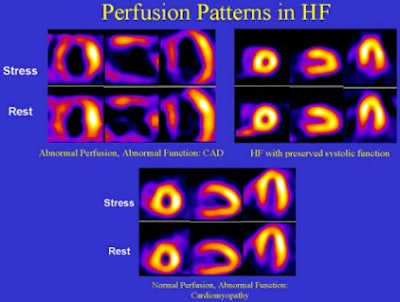
NEW ORLEANS - Myocardial-gated SPECT could play a role in the early evaluation of patients experiencing their first episode of heart failure, according to a poster presented today at the American College of Cardiology meeting.
This research is the first attempt to understand the various pathophysiologies of the initial presentation of heart failure. The study was designed to better define the potential role of myocardial perfusion imaging (MPI) in evaluating patients early.
"The uniqueness of this study lies in the fact that this...study has specifically examined a cohort of patients presenting with the first episode of heart failure. Most previous clinical trials have included patients with chronic, established heart failure," said lead researcher Dr. Prem Soman from Tufts-New England Medical Center in Boston.
Soman and colleagues selected 201 patients from 14 centers who had been hospitalized for first presentation of heart failure, and met heart failure criteria set by the Framingham Risk Score. None of the patients experienced acute myocardial infarction. Additionally, 65% of patients had no previous history of coronary artery disease.
 |
| Perfusion patterns in HF. Top left, abnormal perfusion, abnormal function in CAD. Top right, HF with preserved systolic function. Below center, normal perfusion, abnormal function in cardiomyopathy. Image courtesy of Dr. Prem Soman. |
The group conducted stress/rest-gated, 99mTc sestamibi SPECT scans on all patients and interpreted the data blindly in a central lab, scoring semi-quantitatively. Patients then underwent catheterization on the basis of clinical and imaging data.
According to the results, less than half of the patients actually had coronary artery disease and only a small percentage of them had significant, reversible ischemia. Among the 37% of patients who underwent coronary arteriography, MPI had a 91% sensitivity, 60% specificity, and 89% negative predictive value for significant coronary artery disease, they stated.
While the results show promise, the researchers stressed that the findings are preliminary and that the study design had some limitations.
"Although this is an observational, non-randomized study, it sets the stage for a randomized trial comparing direct cardiac catheterization to gated SPECT imaging guided cardiac catheterization in patients with new onset heart failure. Such a study is being planned. The current guidelines do not have specific recommendations on heart failure patients who do not have angina," Soman said.
By Jerry IngramAuntMinnie.com contributing writer
March 9, 2004
Related Reading
Calcium score improves cardiac risk assessment with standard method, January 15, 2004
Sixteen-slice CTA scanning makes everything better, January 5, 2004
Stress test with SPECT remains main modality for assessing myocardial viability, November 8, 2002
Copyright © 2004 AuntMinnie.com




















